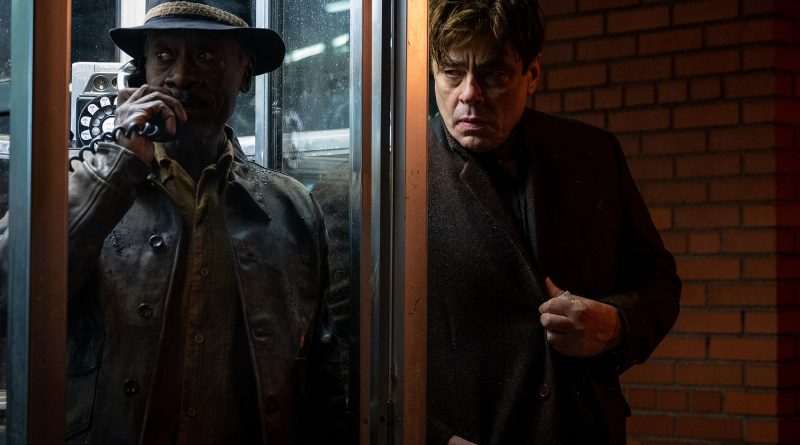‘No Sudden Move’ Review: Soderbergh Doing What He Does Best
I have long had a fascination with Steven Soderbergh as a filmmaker whose work is truly unto itself in ways that the work of very few artists is. He makes movies at a torrid pace, usually at one or sometimes two per year, and the quality of these is all over the place, ranging from masterpieces to garbage and everything in between. Perhaps what is the most striking about his work, both good and bad, is that it is never boring. The filmmaker himself has said he gets bored easily and is always looking for ways to shake things up, and it shows. That said, the good news is that his latest film, the 1950s crime thriller No Sudden Move, is very good, and it’s definitely not boring. It definitely helps that Soderbergh is really good at making crime thrillers.
The film stars Don Cheadle and Benicio Del Toro as two criminals in 1950s Detroit who are brought together for a blackmail job despite already being on the outs with the local mafia. When the job goes wrong, they have to make the best of things, all while not being able to trust each other. The film features an excellent cast in addition to the two leads, including David Harbour, Ray Liotta, Jon Hamm, Brendan Fraser, Bill Duke, and Amy Seimetz, as well as a secret cameo from a Soderbergh favorite. The story is incredibly entertaining, full of winding conspiracies, traps, double crosses, and triple crosses and is told with Soderbergh’s signature efficiency and pace, with much of the deep backstory behind the characters getting dropped here and there with final exposition and the plot constantly going forward. The experience is unusual in the landscape of modern cinema but it is something that Soderbergh does very well. No Sudden Move is fast paced and lively, but also very complex, rewarding viewers who watch carefully and pay attention.
No Sudden Move also has a bit of Soderbergh’s signature stylishness, especially with much of the lighting done in colored washes, but is more on the side of expedience compared to some of his best work, eschewing major flourishes to keep things moving. Much of the movie looks beautiful, although a lot of has major lens distortion which can give one a headache if one looks at the boundaries of the frame too often. I’m sure this was an intentional choice, however I’m not sure what narrative purpose it serves, and can be distracting given how Soderbergh likes to move the camera.
In recent years, Soderbergh’s movies have also had a more pronounced strain of social commentary, often following his pet subjects of money and identity. Like The Laundromat‘s docudrama exposé of the global money laundering system, No Sudden Move‘s narrative revolves around the changing America of the 1950s and the gentrification of black neighborhoods, redlining, auto industry corruption, and the emergence of a new American aristocracy. It works well for the most part but can come off a little heavy handed at times, especially considering socio-political analysis has only become a prominent feature of Soderbergh’s work in the latter half of his career.
No Sudden Move is available on HBO Max and I highly recommend anyone and everyone watch it. It’s not a masterpiece, but it is a very good movie and another technical showcase by one of the world’s most interesting filmmakers.




